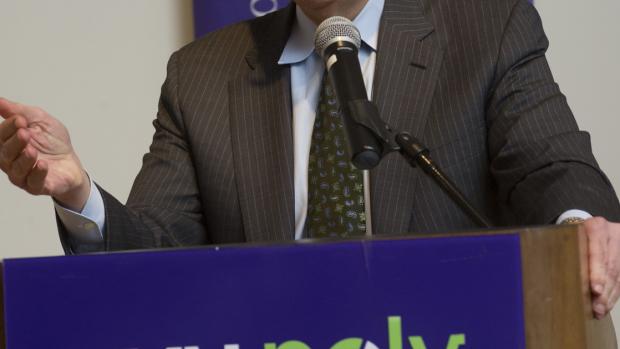Nobel Laureate Economist Myron Scholes Delivers Lynford Lecture

A record turnout of 300 students, faculty, and members of the Polytechnic Institute of NYU community filled Pfizer Auditorium on April 20 to hear Myron Scholes speak as part of the Lynford Lecture Series, which is generously funded by Jeffrey Lynford. Now in its 13th year, the series brings a prominent thinker to campus annually, and 2011 was no different: Scholes is co-originator of the Black-Scholes option pricing model, the conceptual framework widely used to determine the value of derivatives.
The lecture by the world-renowned economist and Nobel laureate touched on various points but generally conveyed Scholes’s belief in intermediation as the only sustainable business model. Granted, that approach requires computationally intensive models, the difficulty of which Scholes recognized. “The price of liquidity is not constant, which makes it hard for us to know when to liquidate,” he admitted.
Scholes went on to elucidate his point. “Finance is really the idea of compressing time,” he said. “It’s trying to decide what inventory to buy today to meet the needs of the consumers of tomorrow.”
Scholes’s presentation was followed by a panel discussion, the first time such a format had ever been incorporated into the lecture series. Lynford, who moderated the panel, believed it would offer a more dynamic experience for the audience, and certainly an energized exchange transpired between panel members. The panel featured Joseph Steinberg, president of Leucadia National Corporation and an NYU-Poly trustee, and William Ackman, founder and CEO of Pershing Square Capital Management LP, a hedge fund. Professor Charles Tapeiro, chair of the Department of Finance and Risk Engineering (FRE) at NYU-Poly, joined the two finance practitioners, and together the trio engaged in a lively discussion with Scholes.
Steinberg, for instance, asked the guest lecturer if he thought behaviorists and statisticians would be able to synthesize and prove useful to government. “I don’t know if I’d say government was useful,” quipped Scholes, drawing laughs from the audience. More seriously, he likened the current administration’s efforts to more strictly regulate the finance industry with locking the barn door after the horse has bolted. “It’s always easy to put plywood over where the horse kicked through,” Scholes said, “but the horse always knows where to kick again.”
Evaluating Scholes’s talk afterward, Lynford believed it offered students real value. “There was a lot of relevance about risk in uncertain times and how much liquidity you need, so when students leave here, they will start to think real-time questions,” he said.
Steinberg had a different take. “If I was a student at NYU-Poly, I would want to make sure that I didn’t spend all my time on theory, that I got involved in the practical applications,” he said. “It was clear from today there was a gap between the theorists and practitioners.”
Fortunately, that gap is precisely what NYU-Poly’s FRE department addresses. Said Professor Tapeiro, “We seek to bridge theory and practice, and what was in that talk was a real confrontation between the two.”
He was appreciative that Scholes offered no singular answer to what he believed to be complex issues. “A basic principle of engineering is that there are never simple solutions,” Professor Tapeiro said.




